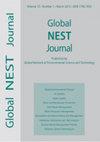Effects of feeding Genetically Modified (GM) Maize on oxidative stress parameters in New Zealand rabbit.
IF 1.2
4区 环境科学与生态学
Q4 ENVIRONMENTAL SCIENCES
引用次数: 6
Abstract
In this study, we investigated the effects of Genetically Modified (GM) Maize on liver and kidney organ weights, malondialdehyde (MDA) and glutathione (GSH) levels of liver and kidney tissues in New Zealand Rabbits. For this purpose, rabbits were divided into three groups: parental, first-generation and second-generation. Each group was divided into two sub-groups i.e. control group and the treatment group. Rabbits on the control group were fed with conventional maize (non-GM), whereas rabbits which are in the treatment groups were fed with GM maize. Six females and six male New Zealand rabbits were used per group. At the end of the experimental period, tissue samples were taken and organ weights, MDA and GSH levels were determined. Overall, as the generations progressed, a statistically significant increase in liver weights and a decrease in kidney weights were observed. There was no statistically significant change as regards MDA and GSH levels of liver and kidney tissues of groups without GM maize inclusion in the diet. However, in all three-generation of GM maize treated groups, there was a significant decrease in GSH levels and a significant increase in MDA levels were observed.饲喂转基因玉米对新西兰兔氧化应激参数的影响
本试验研究了转基因玉米对新西兰兔肝脏和肾脏器官重量以及肝脏和肾脏组织丙二醛(MDA)和谷胱甘肽(GSH)水平的影响。为此,将家兔分为亲代、第一代和第二代三组。每组分为对照组和治疗组。对照组饲喂常规玉米(非转基因),试验组饲喂转基因玉米。每组雌性和雄性新西兰兔各6只。实验结束时,取组织标本,测定脏器重量、丙二醛和谷胱甘肽水平。总的来说,随着世代的发展,观察到肝脏重量的显著增加和肾脏重量的减少。未添加转基因玉米组肝脏和肾脏组织的丙二醛和谷胱甘肽水平无统计学意义变化。然而,在所有三代转基因玉米处理组中,均观察到GSH水平显著降低,MDA水平显著升高。
本文章由计算机程序翻译,如有差异,请以英文原文为准。
求助全文
约1分钟内获得全文
求助全文
来源期刊

Global Nest Journal
环境科学-环境科学
CiteScore
1.50
自引率
9.10%
发文量
100
审稿时长
>12 weeks
期刊介绍:
Global Network of Environmental Science and Technology Journal (Global NEST Journal) is a scientific source of information for professionals in a wide range of environmental disciplines. The Journal is published both in print and online.
Global NEST Journal constitutes an international effort of scientists, technologists, engineers and other interested groups involved in all scientific and technological aspects of the environment, as well, as in application techniques aiming at the development of sustainable solutions. Its main target is to support and assist the dissemination of information regarding the most contemporary methods for improving quality of life through the development and application of technologies and policies friendly to the environment
 求助内容:
求助内容: 应助结果提醒方式:
应助结果提醒方式:


